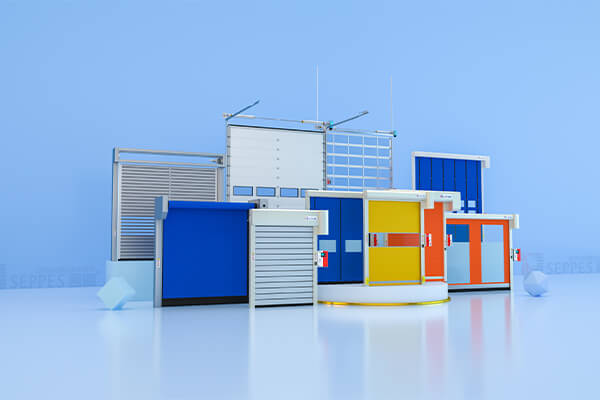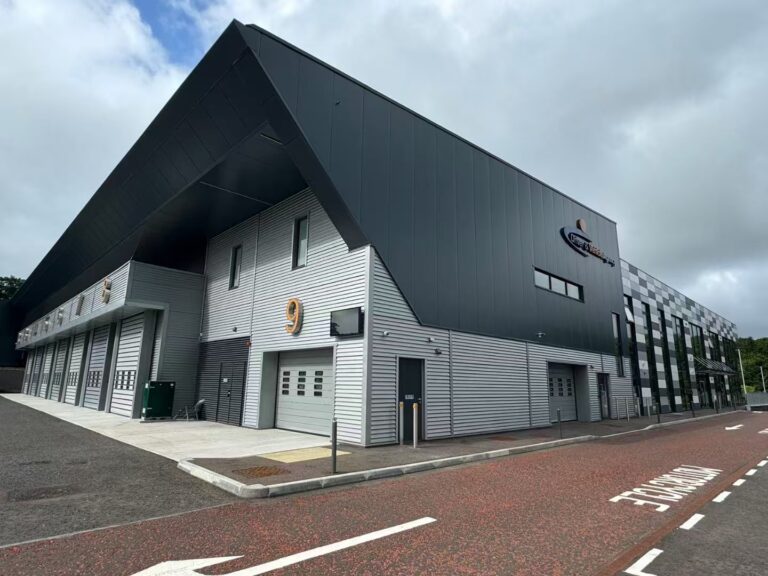INTRODUCTION: Why the South African Industrial Door Market is Worth Watching?
With the rapid advancement of South Africa in infrastructure construction, logistics and warehousing, manufacturing and many other areas, the demand for high-performance industrial doors is continuing to grow. Whether in Durban (Durban), Cape Town (Cape Town) and other port cities in the logistics center, or in Johannesburg around the industrial park, companies rely on efficient, safe and intelligent industrial door products is deepening.
The South African industrial door is no longer just a component of the entrance or exit, but an important part of energy-efficient operations, safety management and smart manufacturing.
South Africa Industrial Doors Market Trends to 2025
According to the latest market dynamics, the following points will profoundly impact the procurement demand for industrial doors in South Africa:
National Development Plan (NDP) Continuous promotion of infrastructure upgradation, leading to the expansion of large-scale factories and logistics parks.
E-commerce and warehouse automation Promote the popularity of high-speed doors and intelligent door control systems.
Cold chain logistics and agricultural export growth, the demand for excellent thermal insulation of industrial doors.
Rising energy prices are encouraging companies to choose energy efficient door structures and control systems.
SABS (South African Bureau of Standards) Compliance requirements are getting stricter and stricter, and importers and local engineers need to pay attention to whether door products comply with technical standards for fire prevention, anti-pinch and energy saving.
Mainstream Industrial Door Types and Applicable Scenarios in South Africa Market
With the continuous growth of South Africa’s manufacturing industry, port logistics, cold chain transportation, mineral resources extraction and other industries, different industries have put forward differentiated functional requirements for industrial doors. In the South African market, the following types of industrial doors are widely used in various industrial projects due to their excellent performance:
High Speed Roll Up Door
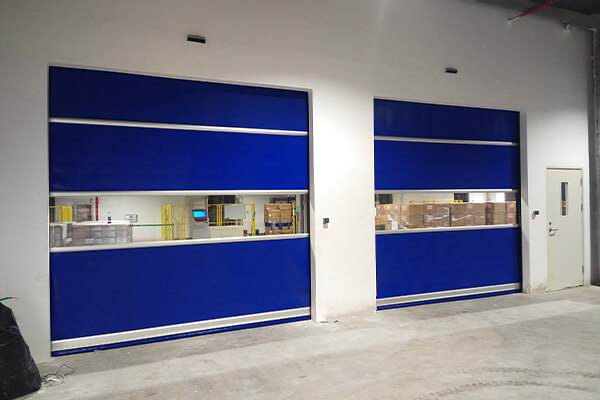
High Speed Roll Up Door is widely used in warehousing and logistics centers, food processing workshops and internal area divisions for its fast opening and closing, energy saving and consumption reduction, and dust and insect prevention characteristics. The door body adopts flexible PVC door curtain, with frequency conversion motor control system, it can realize frequent opening and closing, and guarantee the operation efficiency of high flow volume operation area.
Insulated Sectional Door
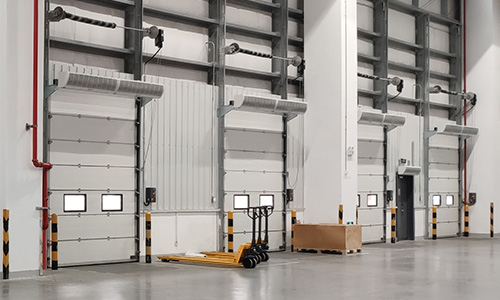
This type of door uses high density polyurethane filled structural panels with excellent thermal insulation properties and good resistance to wind and pressure. They are suitable for cold chain warehouses, food factories and energy facilities in South Africa, which require strict temperature control. The door body supports manual or electric opening, and the sealing strip is fully set to ensure energy-saving effect.
Aluminum alloy rolling door
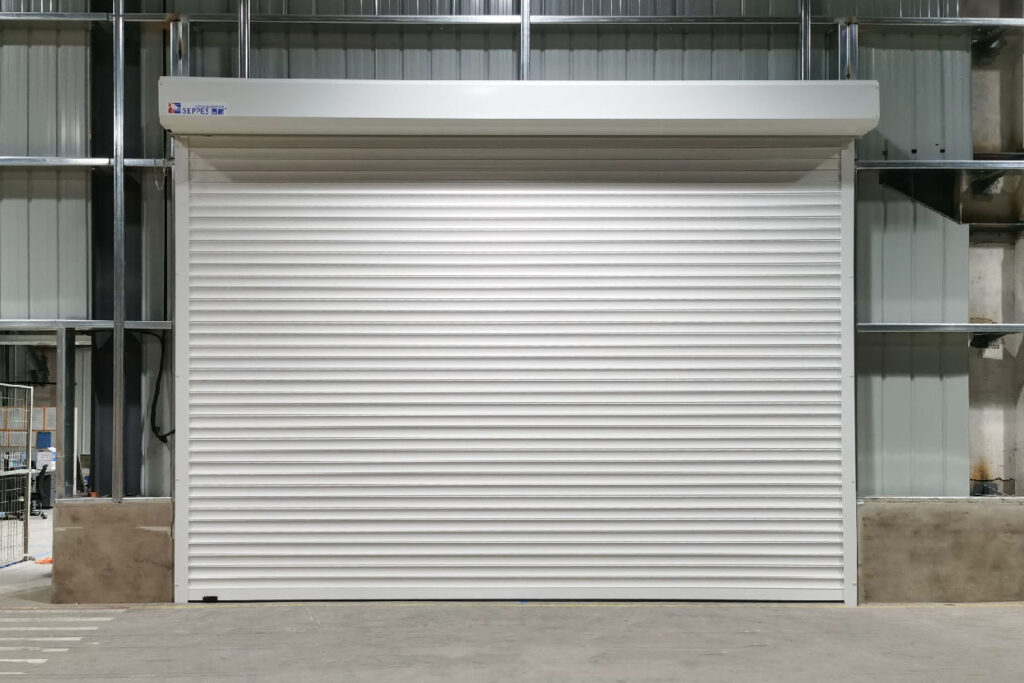
Aluminum Roller Shutter is popular for its strong structure, light weight and corrosion resistance, especially for coastal cities such as Durban, Cape Town and other high salt spray environments. It is used in commercial loading docks, garages, car 4S stores and small factories. This door type is low maintenance and suitable for places with high demands on appearance and practicality.
Hochgeschwindigkeits-Spiraltor
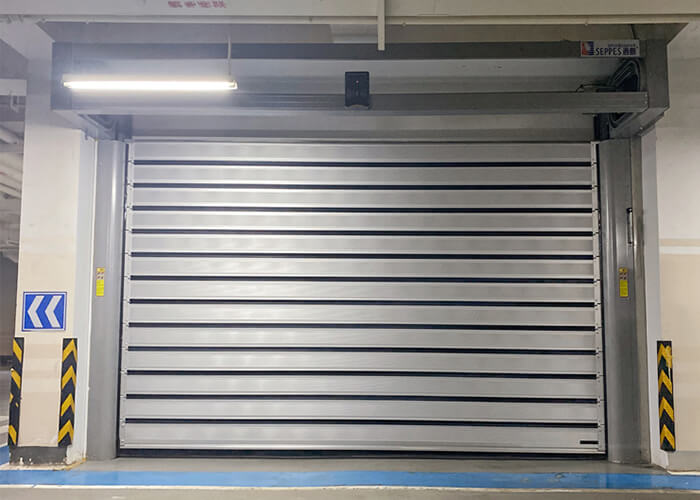
This is a kind of industrial door with both high-speed opening and rigid protection functions. The door plate is made of aluminum alloy composite material, with modern appearance, stable structure and low running noise. It is suitable for the entrance of intelligent manufacturing workshop, high-end automobile manufacturing, electronic plant and enterprises with high requirements on image.
Machine Protection Door

The high-security isolation door is specially designed for automation equipment, robot systems, and high-frequency working areas. In addition, it is equipped with photoelectric sensing, emergency brake, safety interlock, and other functions. As a result, it is widely used in CNC machining areas, robot working islands, stamping lines, and other high-risk zones to effectively protect both the personal safety of operators and the continuity of production.
Below is a comparison table of the above industrial door types and their typical application scenarios for quick comparison:
| Industrial Door Types | Core Features | Typical application scenarios |
| High Speed Roll Up Door | Fast opening and closing, dustproof and energy-saving, automatic repair options | Warehousing and logistics, food processing areas, internal transition doors |
| Insulated Sectional Door | Thermal insulation, wind pressure resistance, custom color door panels | Cold chain warehouses, food factories, pharmaceutical plants |
| Aluminum Roller Shutter | Lightweight, corrosion-resistant, modern appearance, low maintenance | Commercial stores, harbor loading and unloading, garage entrances |
| Hochgeschwindigkeits-Spiraltor | Rigid panels, modern appearance, quiet operation | High-end manufacturing, clean area, showroom door |
| Machine Protection Door | High-frequency opening and closing, safety interlocks, compact structure | Automated production lines, CNC workshops, robot fenced areas |
How to choose the right industrial doors for the South African market?
When choosing industrial door products, South African customers should consider the following factors:
Climatic conditions: high temperature or sandy environment requires the use of more weather-resistant door body and motor system;
Switching frequency: high-speed doors are suitable for frequent opening and closing areas, while lifting doors are more suitable for maximizing space utilization;
Industry needs: cold chain industry focuses on thermal insulation; manufacturing workshops are more concerned about safety and efficiency;
Compliance and certification: whether it meets SABS standards, fire rating, corrosion resistance test, etc.;
Maintenance cost: focusing on the life of the door body’s fragile parts, the degree of easy maintenance and after-sales service response.
Compliance Certification and Import Requirements
The South African market is placing increasing emphasis on product safety and compliance when sourcing industrial doors:
SABS certification: ensures that doors comply with local South African structural safety and electrical codes.
ISO standards: International certification enhances importer trust.
Fire rating testing: certain industrial areas need to pass local fire protection requirements.
Import tariffs: understand South African tariff classifications and rationalize cost structure;
Docking with local registered engineers: we can assist our customers to quickly achieve installation acceptance and technical filing.
Price Composition and Supplier Selection Recommendations
Key factors affecting the price of industrial doors include
Door material (PVC, steel, stainless steel)
Motor brand (e.g. German Firip, Italian SE, etc.)
Control system (manual / remote control / PLC linkage)
Installation size and track design complexity
Local vs Import Comparison
| Dimension | Local Suppliers | Import Suppliers |
| Delivery Time | Shorter | Longer (transportation time + customs clearance) |
| After-sales service | Fast response | Need to plan spare parts in advance |
| Price Stability | Higher (less affected by exchange rates) | Higher exchange rate fluctuations |
| Customization Flexibility | Customizable with on-site measurements | Detailed communication required in advance |
It is recommended to choose a supplier with local agent support and engineering landing ability to reduce the risk.
Maintenance advice: how to extend the life of industrial doors
Maintenance is critical to extending the life of industrial doors and recommendations include:
Quarterly checks of motor operation and lubrication;
Regular cleaning of tracks, sensors and seals;
Checking knob springs, wire ropes, and fall prevention devices for wear and tear;
Setting up airbags and infrared photoelectric protection for high-frequency use areas;
Establishing an annual maintenance program and keeping an inventory of spare parts.
Conclusion: Investing in the right South African industrial doors promotes sound business development
Industrial facilities in South Africa are constantly being upgraded, and the intelligence, energy efficiency and safety of industrial doors have become key criteria. Choosing the right door type not only enhances the image of your business, but also reduces energy consumption and improves efficiency and safety levels.
If you are looking for a professional South Africa industrial door solution, please contact us for a customized quote and product brochure.
Frequently Asked Questions (FAQ)
1. What types of industrial door are most common in South Africa?
The main types include high-speed rolling doors, insulated lifting doors, spiral doors, and aluminum alloy rolling doors. These doors, therefore, are widely suitable for warehousing, manufacturing, cold chain, and other industrial applications.
2. How to choose the right industrial door?
According to the frequency of use, thermal insulation and fire protection requirements, space structure and budget comprehensive consideration, it is recommended to be customized by professional supplier assessment.
3. Do industrial doors comply with South African standards?
High quality products usually meet ISO, CE, SABS standards, etc. Construction projects also need to meet local codes such as NHBRC.
4. How often are industrial doors maintained?
It is recommended that the motor, track and sealing system be inspected every 6 to 12 months, with shorter intervals for special environments.
5. Can I get remote installation instructions?
Yes, many brands provide remote video installation instruction, manuals and necessary technical support services.
Feel free to contact us for a catalog or quote proposal. Do I need to generate another English version?

